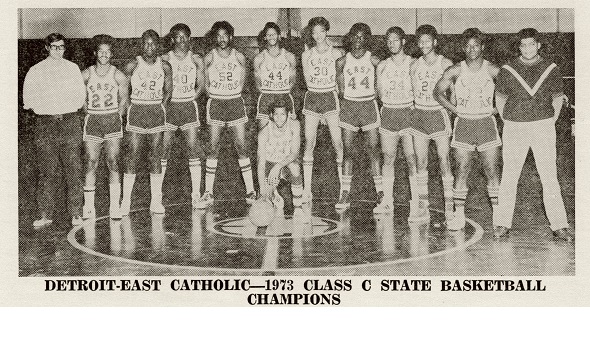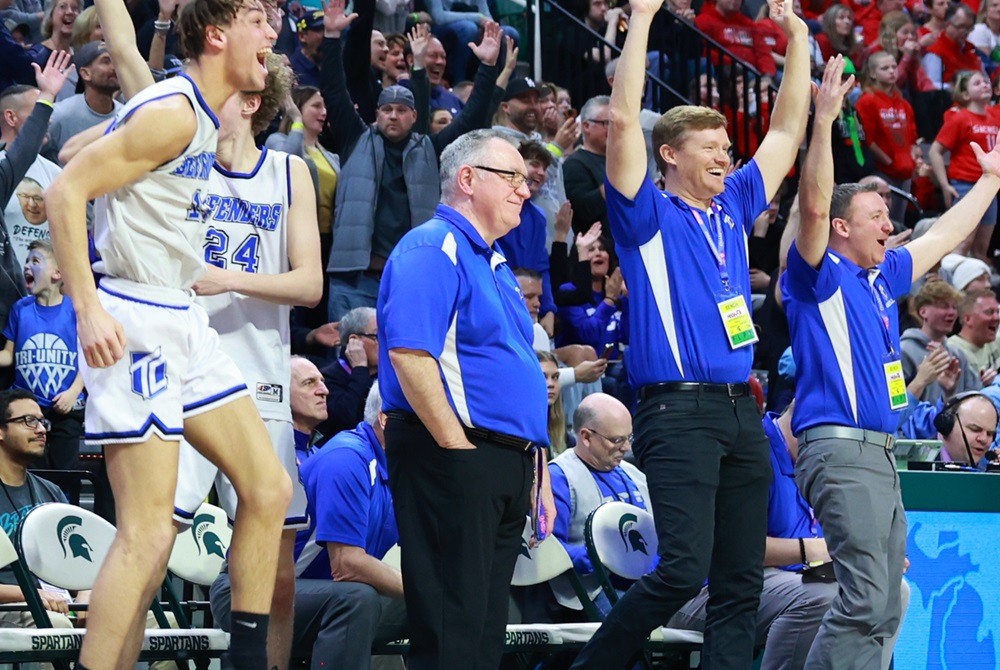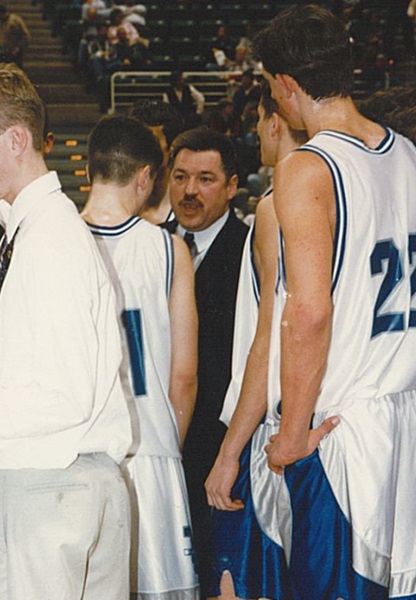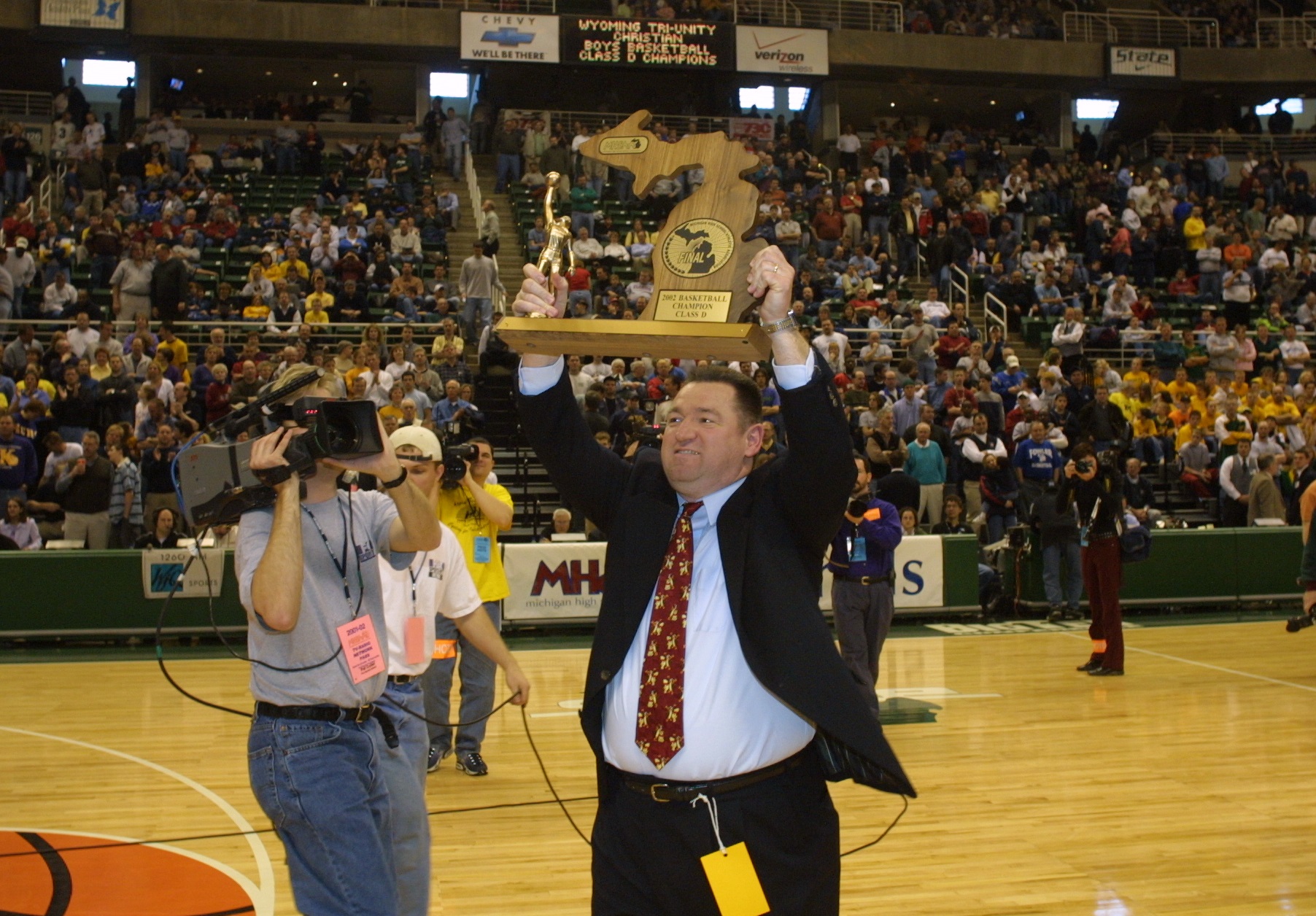
As Soules Guided, East Catholic Reigned
January 31, 2019
By Ron Pesch
Special for Second Half
“I’m surprised to be this far. Some nights we play very good and some nights we play very bad. I just didn’t think we’d be consistent enough to get this far.”
The words were spoken by varsity basketball coach Dave Soules of Detroit East Catholic back in 1973, but, no doubt, could have come from any number of coaches who have found themselves, unexpectedly, somewhere deep into the MHSAA postseason.
It was Soules’ first season in charge of Detroit East Catholic’s varsity, but far from his first year in the building the school occupied.
The Chargers had advanced to the Class B Quarterfinals the previous year, falling to perennial powerhouse River Rouge, 65-64. That East Catholic team was coached by Eugene Dennis Alexander. An all-city player at Detroit Northeastern, Denny Alexander played college ball at Aquinas in Grand Rapids and became only the fourth player in Michigan collegiate history to surpass 2,000 points in a career, joining John Bradley of Lawrence Tech, Dave DeBusschere of the University of Detroit and the University of Michigan’s Cazzie Russell on the list. In May of 1969, at age 23, he was named head coach at East Catholic.
 Denny’s brother, Darryl Alexander, was East Catholic’s best ballplayer in 1972. The team streaked to 11 straight victories during the regular season, then squared off in a series of late February games against larger Detroit Public School League teams. The scheduling was designed to ready the squad for the postseason. Losses to Detroit Southeastern (68-47), Detroit Kettering (80-71) and Detroit Northern (59-58) were a means to that end. While the Chargers did not make the Detroit Catholic League tournament, they were ready to do some damage in the Class B MHSAA tournament.
Denny’s brother, Darryl Alexander, was East Catholic’s best ballplayer in 1972. The team streaked to 11 straight victories during the regular season, then squared off in a series of late February games against larger Detroit Public School League teams. The scheduling was designed to ready the squad for the postseason. Losses to Detroit Southeastern (68-47), Detroit Kettering (80-71) and Detroit Northern (59-58) were a means to that end. While the Chargers did not make the Detroit Catholic League tournament, they were ready to do some damage in the Class B MHSAA tournament.
Only a field goal by River Rouge’s Byron Wilson with 26 seconds remaining prevented the Chargers from doing more. East Catholic trailed in the Quarterfinal by as many as 14 points, and made valiant runs to pull within a point on two occasions, but couldn’t upset coach Lofton Greene’s Panthers. Alexander finished with 19 to again lead the Chargers but was lost to fouls with 1:37 remaining in the third period. Trailing 61-53, East Catholic cut it to 61-60 with 1:35 left to play on a Phil Young field goal. Larry Merchant’s pair of free throws again brought the margin to a single point, 65-64 – but with only five seconds left, the Chargers were out of miracles.
River Rouge, on the other hand, was not. The Panthers would advance through the Semifinals and then survive another thriller, escaping with another one-point victory in the title game against Muskegon Heights. That win marked their 12th Class B title in 19 years.
The Chargers finished the season with a 16-7 record. Alexander earned Associated Press Class B all-state honors that season as a senior, averaging 20 points, 13 rebounds and six assists per game. Come the fall, the brothers headed north to Central Michigan University, where Darryl became a prized recruit. In mid-September, CMU president William Boyd announced Denny had been hired as an assistant coach.
In 1977, Denny was interviewed for the head coaching vacancy at Wayne State, and then was named head coach at Xavier University in New Orleans in 1978.
In 1966, with shrinking enrollments driven by flight of parishioners to the suburbs and rapidly changing neighborhood demographics, the Roman Catholic Archdiocese of Detroit directed that four Catholic high schools on Detroit’s east side – St. Catherine, St. Rose, Annunciation, and St. Charles – consolidate into the old St. Catherine building at 4130 Maxwell Street.
The amalgamation was christened Detroit East Catholic, and it opened its doors in the fall of 1967.
But the mergers were simply not enough. Needs for new equipment, combined with increased costs for teacher salaries and legislative changes to funding meant a need to increase tuition to cover expenses. That, in turn, led to even more departures.
 “The East Side Catholic schools ran up a total deficit of over $1 million last year,” said Bishop Thomas J. Gumbleton, vicar general of the archdiocese, announcing additional closings and mergers of high schools and elementary schools planned with the conclusion of the 1968-69 school year.
“The East Side Catholic schools ran up a total deficit of over $1 million last year,” said Bishop Thomas J. Gumbleton, vicar general of the archdiocese, announcing additional closings and mergers of high schools and elementary schools planned with the conclusion of the 1968-69 school year.
Detroit St. Anthony and Detroit Elizabeth were merged into East Catholic to help address the deficit and exodus. With the changes in the fall of 1969, East Catholic High School was relocated from St. Catherine’s to the St. Anthony building a mile away at the corner of Field and Frederick streets.
Soules had graduated from Dearborn Sacred Heart in 1957 and then the University of Detroit. He was hired as an English teacher at St. Anthony and became the school’s JV basketball coach in 1962. In 1964, he took charge of the varsity team.
“When we merged (into East Catholic) they divvied up the jobs and Dennis got the basketball job,” said Soules in 2005 to Mick McCabe, Detroit Free Press sportswriter. “If I’d have got the job, I’d have lost my mind. I mean literally. The merger was painful. Everybody hated everybody else …”
In May 1972, the Free Press had interviewed Soules about the challenges and the future of the school located at 5206 Field. As an assistant principal, he spoke for those who remained.
“From here, there isn’t any place to go. You close up, and you go out of business. If we keep working at it and keep believing in it, it’s gonna keep going. It has so far. If we close, there’s no inner city Catholic school on the lower east side,” he said.
Raffles, paper drives, lollipop and baked good sales, car washes, fish dinners and dances all contributed to keeping the doors open.
Making a new school community from all of the former had not come easily.
“It was hell. I lost 25 pounds last year. We lost a lot of good staff people. But we came back this year, and, all of a sudden, people could smile at each other in the halls. That’s important. As people got to know each other, they did become friends,” Soules added
With Alexander’s late departure, Soules became the school’s newest varsity basketball coach. At the time, no one knew that he would also be the school’s last.
With the graduation of Darryl Alexander, the expectations of the team, loaded with juniors and sophomores, were limited. Smaller enrollment meant the team had fallen a classification come tournament time. With a 5-3 mark, the Chargers were No. 5 in Hal Schram’s weekly Free Press Class C Top Ten in early January, but had fallen well out of the United Press International’s Top 20 Class C rankings by mid-February with a 12-4 record. The team was quickly eliminated in the annual Detroit Catholic League tournament and, unranked in the final state polls, carried a 12-6 record into the MHSAA postseason. Following District wins over Hamtramck St. Florian – ranked eighth by AP – and Hamtramck St. Ladislaus, Soule’s crew quickly changed the landscape in the opening round of the Class C Regionals.
 “Just two days into regional play, the tourney is starting to live up to its Pseudonym – ‘March Madness’”, wrote Harry Atkins for The Associated Press.
“Just two days into regional play, the tourney is starting to live up to its Pseudonym – ‘March Madness’”, wrote Harry Atkins for The Associated Press.
“The Chargers were given hardly a chance against a talent-rich Dearborn St. Alphonsus team in Class C action,” continued Atkins, “but East Catholic didn’t let Dearborn’s No. 2 ranking scare them as they matched the Arrows basket for basket.” Trailing by six with 1:46 left to play, Larry Merchant’s field goal with 46 seconds left tied the score. “Then Mike Walton hit a free throw with one second on the clock to give East Catholic its upset.”
Mike Woods led the team with 21 points. St. Alphonsus exited the tournament with a 22-2 mark.
On a very snowy evening across Michigan, East Catholic took advantage of its height and survived a 27-point performance by New Haven’s Don Sims to win their Regional and advance to the Quarterfinals of the MHSAA tournament. Merchant scored 10 of the Chargers’ 11 points in the final four minutes to seal the 68-63 win.
Merchant showed off his ball-handling skills dishing out 12 assists in the 71-48 Quarterfinal win over Erie-Mason. Sophomores Greg Guye, a 6-foot-6 center, and Walton, a 6-2 sophomore guard, each pumped in seven field goals, both finishing with 14 points, to lead the Chargers in scoring.
Merchant scored 26, while Walton added 23 – 18 points over his season average – as East Catholic rolled to a 66-55 Semifinal victory over Battle Creek St. Philip to earn a trip to the championship game.
“We had accurate scouting reports on East Catholic,” said St. Philip coach Tom Miller following the game. “They were quick. I knew we were in trouble when we had a fast break – and they had two guys at the other end waiting for us,” Miller told UPI’s Richard Shook, laughing. “At least we got beat by a team that was better than we were.”
The state’s scribes had a week to contemplate the upcoming Final matchups as Michigan’s tournament format of the time injected seven days between the Semifinal and Final rounds. Soules had never won a tournament game as a coach at St. Anthony, and noted his club’s strengths and challenges to the media during the time.
“This is a young team which makes mistakes,” he told Atkins of the AP, “but we don’t quit and we’ve won some games on hustle in the last few minutes. It is difficult to key on one player and beat us, because we have excellent balance.”
In a conversation with Schram he noted that his team had a tendency to work out big leads, then start to get sloppy.
“We’ve never put anyone away yet,” he added. Schram noted that Soules took only half of the 700 tickets allotted East Catholic at the state association. “I won’t sell all that I have. These kids simply don’t have the bread to go running all over the state.”
“I don’t believe many of our students or fans have a great amount of confidence in us,” declared the coach, but emphasized that was not the view of the team. “They want this state title and will fight all the way to win it Saturday.”
By most, if not all accounts, not many others had faith in the Chargers’ chances in the championship matchup.
“St. Stephen lost in the ‘C’ finals in 1972 to Shelby and have their key players returning,” wrote Fred Stabley Jr. in the Lansing State Journal. “Led by 6-5 Elijah Coates and 6-2 Jimmy Beavers, St. Stephen has the size and speed to win it all this year.”
“Every game is a home game for Saginaw St. Stephens,” noted Atkins in his pregame AP write-up. “The Titans have a frenzied following of nearly 1,500 fans at every tournament game and you can bet your last lottery ticket they’ll all be in Ann Arbor for Saturday’s showdown.
 “On paper there’s no way you can pick a favorite … but neither St. Stephens nor East Catholic has been winning on paper … Saginaw, however, has done a slightly better job of it and who can measure how much their loyal throng of well-wishers has contributed to that record.”
“On paper there’s no way you can pick a favorite … but neither St. Stephens nor East Catholic has been winning on paper … Saginaw, however, has done a slightly better job of it and who can measure how much their loyal throng of well-wishers has contributed to that record.”
“East Catholic won’t make the trip to Ann Arbor for nothing,” wrote Schram, as his alter ego, “The Swami,” on the Saturday of the game. “There’s a trophy for the runnerup.”
Saginaw coach Sam Franz, celebrating his 25th year as a coach, may have been the only skeptic.
“Any team that comes this far has to have something more than luck going for them,” said Franz to Schram.
The story of the Final can still be seen in silence today.
“From the late 1940’s to the mid 1970’s the Michigan High School Athletic Association shot portions of the action at its basketball finals on 16mm film,” notes John Johnson, communications director for the MHSAA. “Some of the films only have portions of the second half and the postgame awards; some have most of the action. None of the films have sound.”
One of the surviving films is the 1973 Class C classic. The Chargers blew a 10-point lead late in the third quarter. With 2:29 remaining, the game was tied, 46-46. A free throw gave St. Stephen the lead 47-46 with 2:16 to play.
The final two minutes of film spools out the story, in thrilling – and heartbreaking – detail.
In the days before the possession arrow, jumps for possession could mean the difference between victory and defeat. East Catholic won a possession on a jump ball, but a miss by the Chargers and a defensive rebound by St. Stephen sent the Titans into stall mode. However, a turnover grabbed and converted by Merchant gave the Chargers a 48-47 lead with just over a minute to play.
A pair of free throws by Elijah Coates pushed St. Stephen out front 49-48 with 45 seconds left. Yet with four seconds remaining on the clock, Merchant's 18-foot jumper from left of the key gave the Chargers a 50-49 victory.
The front page of the Free Press shouted the headline, “A Chance to Be Somebody,” with a story representative of the time. Focused on the players and their struggles, the title could have easily applied to the re-start of a coaching career, and a life, which ultimately would become legendary at least on Detroit’s east side.
 To students, he became famous for a rope of keys around his neck, his pad of detention slips and the substitution of “Hot Dog” or “Baby” for names when trying to keep the halls clear during the school week. Saturday mornings for many included time in “The Jug” serving detention.
To students, he became famous for a rope of keys around his neck, his pad of detention slips and the substitution of “Hot Dog” or “Baby” for names when trying to keep the halls clear during the school week. Saturday mornings for many included time in “The Jug” serving detention.
“He’s more to East Catholic than just the basketball coach,” Lou Miramonti told Jo-Ann Barnas of the Free Press in 1996. Miramonti, the athletic director at Royal Oak Shrine, knew of whom he spoke. “It’s the most visible thing he does, but it may well be the least important thing that he does at that school and for those kids.”
Soules was assistant principal, disciplinarian, tuition collector, the giver of rides, and one who called students just to make sure homework was getting done. And, of course, the coach that guided the talent that came through the halls of a building that today no longer stands.
Playing witness in 2005 to another sweeping closure of schools by the Detroit archdiocese – one that included the shuttering of East Catholic – Soules discussed a career he never could have predicted.
“I was the right guy who just happened to be in the right place at the right time,” he explained to McCabe as he tried to come to grips with the announced closing. Soules’ coaching career at East Catholic featured 544 wins against 250 defeats over 33 seasons. The Chargers’ athletic cases included eight MHSAA Finals championship trophies won by his teams. To this day, only Greene at River Rouge won more.
An honest, humble and caring individual with a “self-deprecating sense of humor,” he discussed those earliest of days:
“The saddest part is, I was so dumb at the time, we didn’t win it again (over the next two years) … I didn’t know how to deal with the 2-2-1 three-quarter court press (in 1974) … in the semis (in 1975) … we just weren’t ready to play.”
“With some of the kids I had, you didn’t have to be a genius,” he stated. “I’m a lot better coach now than I was then.”
In 2009, Soules passed away after a three-year battle with cancer. His extended family numbered thousands.
The many condolences that followed, and that continue today, are a heartfelt testament to the difference one man can make in a life, both on the court and in the hallways, of an ancient building built with the lofty purpose of education.
 Ron Pesch has taken an active role in researching the history of MHSAA events since 1985 and began writing for MHSAA Finals programs in 1986, adding additional features and "flashbacks" in 1992. He inherited the title of MHSAA historian from the late Dick Kishpaugh following the 1993-94 school year, and resides in Muskegon. Contact him at [email protected] with ideas for historical articles.
Ron Pesch has taken an active role in researching the history of MHSAA events since 1985 and began writing for MHSAA Finals programs in 1986, adding additional features and "flashbacks" in 1992. He inherited the title of MHSAA historian from the late Dick Kishpaugh following the 1993-94 school year, and resides in Muskegon. Contact him at [email protected] with ideas for historical articles.

PHOTOS: (Top) The Detroit East Catholic 1973 Class C championship team. (2) Denny Alexander was hired as East Catholic boys basketball coach in 1969. (3) The former Detroit St. Anthony High School. (4) Dave Soules coaches his East Catholic players during the 1973 season. (5) Film survives from the Chargers’ 1973 championship game win over Saginaw St. Stephen. (6) Soules instructs his team during a 1996 game. (7) The Detroit East Catholic gymnasium, after the school’s closure. (Photos gathered by Ron Pesch.)

Keeler Approaching Milestone Win Amid Final Season of Legendary Tri-unity Career
By
Dean Holzwarth
Special for MHSAA.com
December 18, 2024
WYOMING – Mark Keeler has spent four decades coaching boys basketball at Tri-unity Christian High School.
 And while he has many stories that he shares often, one of his favorites comes from the beginnings of the program.
And while he has many stories that he shares often, one of his favorites comes from the beginnings of the program.
“We didn't have bleachers in our gym when I first started,” Keeler said. “I would make my boys set several rows of chairs up so people could watch our games. And then they eventually added bleachers that were donated by the church.”
Keeler’s teams have been filling up the bleachers since he took the reins for the 1983-84 season, and he has built the program into one of the most successful in the state.
Now, as he leads his team through the opening month of his 38th and final campaign, Keeler is nearing a rare milestone only achieved by a few. He is expected to soon become the fourth coach in MHSAA history to reach 700 wins.
Tri-unity is 3-1 this winter, making Keeler a combined 697-217 coaching the Defenders. Roy Johnston is the winningest coach in state boys basketball history with 833 victories earned during stints at Yale, Howell and Beaverton before retiring in March. He is followed by longtime River Rouge coach Lofton Greene (728) and Clarkston’s Dan Fife (703).
“It's a statement of longevity with these men,” Keeler said. “All three of them were very successful at the schools they were at and most of them spent a long time at one school, just like I’m doing now. I’ve never coached anywhere but Tri-unity, and that is quite a privilege to have been a part of this school.”
Keeler reached 697 wins with last week’s nonconference victory over Wyoming Kelloggsville and can move closer to the milestone with another Friday night against Grandville Calvin Christian. The Defenders then play East Grand Rapids and Grand Rapids West Catholic, respectively, at the Cornerstone University Holiday Classic at the end of the month.
Keeler, who retired from a 40-year teaching career two years ago, started coaching in 1983-84 when Tri-unity had only an eighth and ninth-grade team. After two seasons of playing subvarsity, the school formed its varsity team for the start of the 1985-86 season, with Keeler at the helm. After three seasons with the varsity, he took a break from coaching (but continued teaching and serving as athletic director).
 “I had to get my priorities right with the Lord,” Keeler said. “I was trying to do too much and lost focus, and it was something that needed to be done. I look back, and it was something that set me up for the rest of my coaching career.”
“I had to get my priorities right with the Lord,” Keeler said. “I was trying to do too much and lost focus, and it was something that needed to be done. I look back, and it was something that set me up for the rest of my coaching career.”
Keeler returned for the 1990-91 season and has been at the forefront ever since. He has guided the Defenders to six state championships, including last year’s with a victory over Mount Pleasant Sacred Heart in the Division 4 Final. Tri-unity also has won titles in 1996, 2002, 2006, 2011 and 2022, while finishing as Finals runner-up six times.
Keeler’s teams also have reached the Semifinals 15 times, won 19 Regional championships, 26 District titles and 22 conference championships. His players have filled Class D and Division 4 all-state teams for years, with surely the best-known 2000 grad Chris Kaman – who went on to play at Central Michigan and 13 seasons in the NBA – and Brandon Voorhees, who led Tri-unity to the 2002 title as a senior, went on to CMU and then Park University in Missouri, and played professionally overseas.
“I’m so glad that I’ve been able to just be here this long,” said Keeler, who was inducted into the Basketball Coaches Association of Michigan Hall of Fame in 2016. “I love Tri-unity. My wife taught there, we met there, and my daughters went all the way through and graduated from there, so it's always been a part of my life. There's been so many quality people that have been there along the way.
“I've been very blessed to have had so many quality players and parents and coaches. It’s amazing when I look back at all those that have been a part of the program.”
Keeler, a man with a strong Christian faith, could’ve gone elsewhere during his career, but believed he had a calling at Tri-unity.
“I've had some opportunities to move on and go to different places, but whenever I prayed about it I always thought that this is where the Lord wanted me and that's always my priority,” Keeler said. “I want to please him first, because as a Christian that's my priority. I just thought this is where he placed me, so I’m going to set roots and do the best I can.”
Tri-unity senior guard Keaton Blanker, one of two returning starters on this year’s team, is excited to see his coach reach such a prestigious milestone.
“It’s the perfect scenario for him with this being his last year and getting to 700 wins,” Blanker said. “He’s going to leave his mark, and it’s well deserved. Being a small Division 4 school, he’s helped to put the program on the map and I remember growing up and watching his teams win state titles. I was waiting for the opportunity to play for him so I could help do the same thing.”
While Keeler is grateful for the unbridled success of the program on the court, creating lasting relationships with his players off the court and helping them grow in their faith has been equally gratifying.
 “I know without a doubt that the Lord has blessed our program.” Keeler said. “There are a lot of great coaches out there that are probably better at Xs and Os than I am, but I think I’m a strong motivator and build good relationships with the players and get to know them.
“I know without a doubt that the Lord has blessed our program.” Keeler said. “There are a lot of great coaches out there that are probably better at Xs and Os than I am, but I think I’m a strong motivator and build good relationships with the players and get to know them.
“I let each player know that I want them to grow in their walk with the Lord, and that's where my priority is. To be an influence toward Christ, not away from Christ.”
Past Tri-unity standout Brent Voorhees, who has been Keeler’s assistant coach the last several years and will succeed him next season, said Keeler has never changed his approach to the game.
“Coming back to coach with him, the one thing that stands out is he doesn't waver on his principles,” Voorhees said. “A lot has changed in the sport in terms of analytics and how coaches attack things, but he has definitely stayed firm in his approach that it’s defense first and he preaches the team aspect. It’s never about an individual.
“He doesn’t let anything off the court distract him from goals. He's really good at keeping the goal in front of the guys. He keeps them focused on the goal of winning state championships and also becoming great, young Christian men in the community, which is what he stands for and always comes first.”
The Defenders graduated eight players from last year’s team, but Blanker and senior Joey Mellon are back with several newcomers as they bid to send Keeler out with one more title at Breslin Center.
“I enjoy putting them together and getting them to mesh as a team,” Keeler said. “For me, I have learned that defense wins championships. The old adage that offense wins games, but defense wins championships ... I so believe that with all my heart.”
Reporter Dean Holzwarth, a longtime member of the West Michigan media, is also the junior varsity head coach and a varsity assistant for the Tri-unity Christian boys basketball program.
 Dean Holzwarth has covered primarily high school sports for Grand Rapids-based WOOD-TV for five years after serving at the Grand Rapids Press and MLive for 16 years along with shorter stints at the Ionia Sentinel and WZZM. Contact him at [email protected] with story ideas for Allegan, Kent and Ottawa counties.
Dean Holzwarth has covered primarily high school sports for Grand Rapids-based WOOD-TV for five years after serving at the Grand Rapids Press and MLive for 16 years along with shorter stints at the Ionia Sentinel and WZZM. Contact him at [email protected] with story ideas for Allegan, Kent and Ottawa counties.
PHOTOS (Top) Surrounded by celebrating players and assistant coaches (including the author, far right), Tri-unity boys basketball coach Mark Keeler (hand in pocket) enjoys a moment near the end of last season’s Division 4 championship game. (Middle) Keeler, middle, huddles with his team during the 1997 run to Breslin, when the Defenders finished Class D runners-up. (Below) Keeler raises the 2002 Class D championship trophy to the cheers of Tri-unity’s supporters. (MHSAA file photos.)

